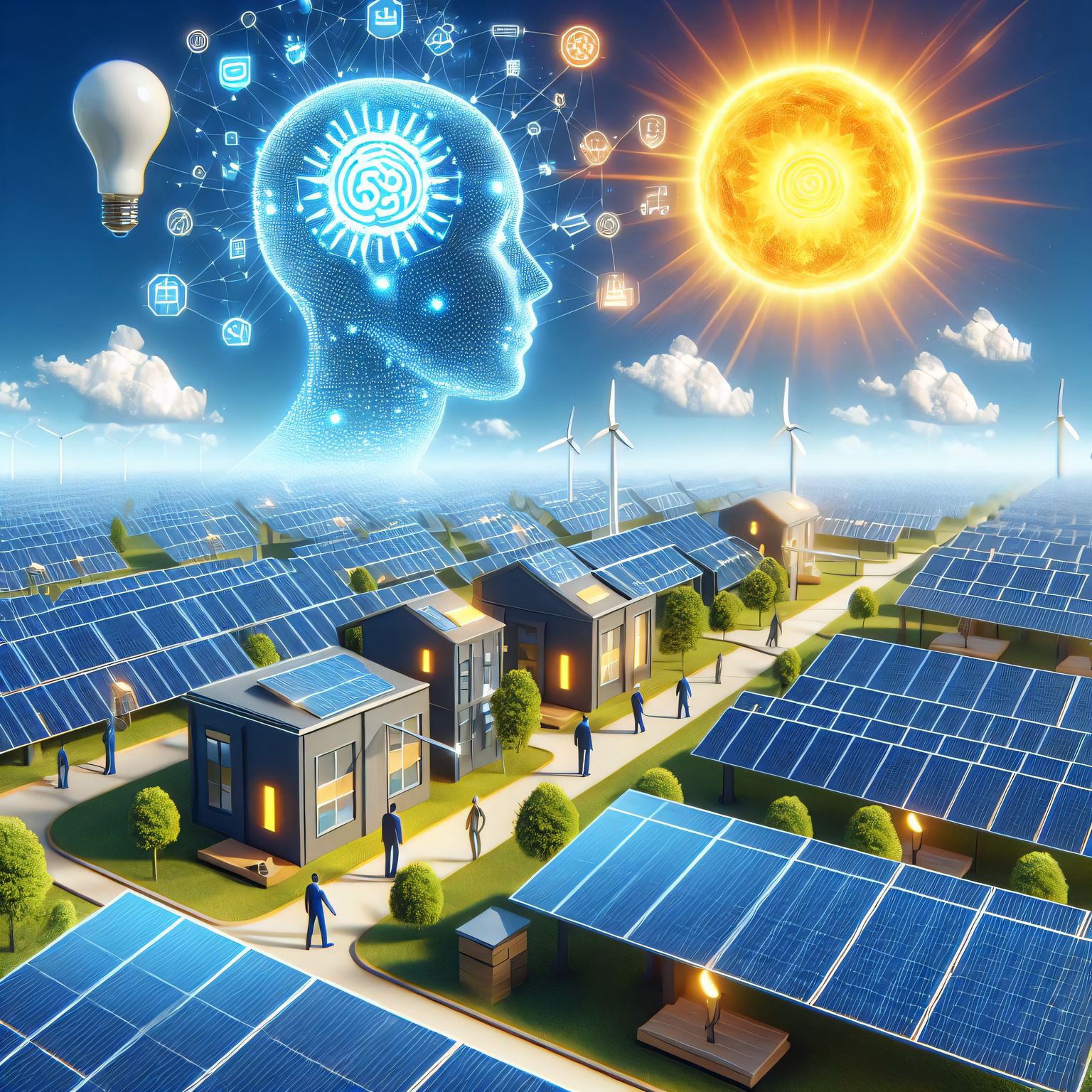Imagine harnessing the limitless energy of the sun by installing solar power panels on your roof. No more power bills, no more reliance on fossil fuels, and no more navigating through confusing electricity plans. Just clean, renewable energy from the sky above, powering your home. This sunny future is getting closer, thanks to artificial intelligence (AI) making solar panels smarter than ever before.
Recent breakthroughs in AI are bringing transformative changes to home solar power systems. With the installation of AI-enhanced solar panels, your home can soon tap into a brainpower boost that makes these panels more efficient at catching rays, predicting the weather to maximize energy production, and even diagnosing problems to avoid failures. Read on to see how installing solar power with AI is lighting the way towards affordable, hassle-free home solar energy.
AI Optimizes Solar Panel Efficiency
Today’s typical solar panels convert only around 20% of sunshine into electricity for your home to use. The rest is wasted as heat or light that escapes. But AI is changing that equation by helping panels squeeze much more power from each ray of sunshine.
By tweaking the semiconductor material and panel design, AI-driven simulations can create solar cells that absorb more of the sun’s spectrum and convert over 47% of light into usable energy. That’s more than double traditional panels! For a residential system, this can mean needing fewer panels to meet your home’s electricity demands.
For example, BrainBox AI optimized the panel components and layout to create a high-efficiency module that produces 440W with 132 solar cells. Comparable conventional panels require 156 cells to achieve the same wattage. This increased efficiency translates directly into better space utilization and lower system costs.
AI also lets your panels tune themselves in real-time, adjusting to shadows and changing weather conditions to maintain peak efficiency throughout the day. Sensors feed data like solar irradiation and temperature into machine learning algorithms that dynamically optimize the system’s configuration.
By tilting panels to follow the sun’s path or altering string voltages to mitigate losses from clouds or haze, your AI-enhanced system maximizes energy generation at all times. More efficiency means you’ll get more usable energy from the same number of panels. So you may be able to meet your home’s electricity needs with a smaller, more affordable rooftop solar system.
The sun provides us an unlimited supply of free energy. Like squeezing more juice from an orange, AI helps solar panels make the absolute most of this precious resource.
AI Predicts Weather for Your Solar System
One key challenge with solar power is its variability throughout days and seasons. Some days are sunnier than others. And weather fluctuations make predicting how much energy your panels will produce difficult. But new AI-powered forecasting models give your solar system a unique edge to anticipate irradiance.
By continuously analyzing hyperlocal weather forecasts, historical patterns, satellite imagery and other meteorological datasets, AI algorithms in your panels will know when a cloudy or rainy week is approaching. The system can then optimize energy storage in your home battery accordingly, saving surplus sunshine from sunny days for use during gloomier weather.
Let’s consider a concrete example. Your AI-enhanced solar system may predict significantly overcast conditions for the upcoming week based on a approaching storm system. In the days prior, it stores excess energy in your battery even if it’s fully charged to build a buffer. When heavy clouds actually arrive, your home can keep drawing full power from storage. Pretty clever!
This short and long-term solar forecasting maximizes self-consumption of the energy your panels produce while reducing uncertainty about availability. Your AI-powered system handles the nuances of irradiance prediction so you enjoy steady, reliable solar energy despite weather swings.
AI Enables Self-Maintenance
Like any system, solar panels can unexpectedly fail or underperform if not properly maintained. But what if they had AI inside to continuously monitor themselves and prevent problems before they even happen? The future is here.
AI software can perpetually analyze performance data from sensors to detect abnormalities like dust buildup, cell microfractures or electrical malfunctions often imperceptible to humans. It then schedules cleaning or repairs proactively to avoid issues that would interrupt energy generation.
For example, by tracking power output over time, AI algorithms can identify panels with downward performance deviations indicative of dirt accumulation or component fatigue. The system then prompts a cleaning or service checklist prioritized by severity, keeping everything running in peak condition.
Computer vision AI can even visually inspect your roof system via drone to spot damage or maintenance needs before human eyes ever would. By scanning for damaged cells, weathering, and shade obstructions, it provides an intelligent diagnostic perspective from the air. This self-healing capability powered by AI keeps your solar system running optimally with minimal headaches.
AI Makes Home Solar Management Easy
Early solar power systems required homeowners to actively monitor panels, track performance, and schedule maintenance. It was a hassle! But artificial intelligence is changing the game.
AI-powered systems manage themselves end-to-end, without you having to babysit complex software or constantly check on your panels. Here are just some of the ways AI simplifies solar power:
- Easy monitoring: AI analyzes sensor data from your panels to provide a simple mobile app showing real-time performance and notifications for any maintenance needs. No manual tracking required.
- Automated maintenance: As mentioned, AI schedules cleaning, repairs, and inspections for you based on predictive analytics. It even coordinates service visits seamlessly.
- Bill optimization: AI monitors electricity use, weather forecasts, and utility rates to optimize when your home draws power from panels vs the grid for maximum savings.
- Remote access: Check your system’s status and make adjustments from anywhere with AI cloud connectivity. Troubleshoot issues and control settings remotely.
- Voice control: Use virtual assistants to operate your system with voice commands. Ask for performance updates, check battery levels, and more with simple phrases.
With AI-enabled smart features like these, you can enjoy the benefits of home solar power with greatly reduced complexity. It’s like having an intelligent assistant managing the technology for you.
Choose AI-Powered Solar Panels For Your Home
The solar industry is witnessing a revolution, with several leading companies offering panels with built-in Artificial Intelligence (AI) to optimize performance. Here are some top options to consider:
- SunPower M Series uses machine learning to continuously tune parameters for maximum efficiency in real-world conditions. Their M445W panel features AI-assisted Maxeon solar cells and achieves up to 21.2% efficiency. It has a nominal power (DC) of 445W and an output power (AC) of 369 VA – 384 VA. The operating temperature ranges from -40°F to +185°F.
- LG NeON R detects faults and performance issues early using AI monitoring of sensor data. The N2W550 panel has AI that tracks voltage and temperature data to forecast degradation. It has a module efficiency of up to 22.1% and a temperature coefficient of -0.30%/°C.
- Panasonic EverVolt Series uses AI to monitor individual cells and adaptively reconfigure electrical connections to avoid mismatches and improve harvesting. The VBHN330SA17 panel integrates AI for a +19% energy yield. It has a rated power output of 360W, an efficiency of 20.6%, and a degradation rate of 0.25%.
- SolarEdge Smart Panels have AI built into the power optimizer chip, providing panel-level monitoring and anomaly detection. Their P405 optimized panel has automated issue detection for reliability.
- Voyage Control Solar uses AI camera systems and machine vision to autonomously inspect panels for damage, dirt, and defects. They plan to sell panels with fully integrated AI.
While AI-enhanced panels may cost more upfront than conventional options, the long-term benefits of improved efficiency, reduced maintenance, and better reliability quickly pay for themselves. Supporting this emerging technology helps drive innovations that will make solar even more affordable and accessible.
If you’re considering going solar for your home, be sure to look into panels with intelligence built-in. AI technology can ease the transition to clean, renewable solar energy while saving you money over the system’s lifespan.



